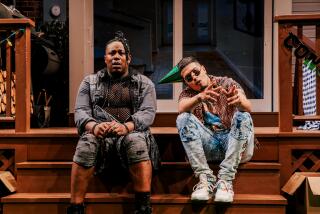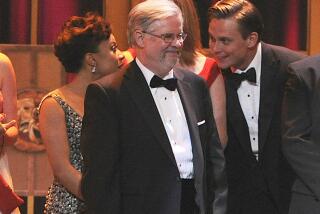Rupert Murdoch-inspired satire ‘Great Britain’ opens in London
A thinly veiled satire of the phone-hacking scandal that engulfed Rupert Murdoch’s tabloid newspaper empire, “Great Britain” is a play with a surfeit of topical relevance. The new stage drama by “One Man, Two Guvnors” playwright Richard Bean opened this week at London’s National Theatre.
“Great Britain” tells the story of fictional media mogul Paschal O’Leary and a female editor, suggestively named Paige Britain, who works at one of his publications, the Free Press, and is unburdened by journalistic scruples.
In the play, Britain -- the character and perhaps the country too -- becomes embroiled in an ethical quagmire involving Free Press journalists, while other public maelstroms, including one involving members of Parliament, compete for the nation’s attention.
The play opened shortly after a verdict was handed down in the case involving former News of the World editor Rebekah Brooks. In June, Brooks was acquitted of charges relating to a phone-hacking scandal. However, Andy Coulson, a former journalist in the Murdoch empire and former aide to Prime Minister David Cameron, was found guilty.
The National Theatre had managed to keep “Great Britain” a secret from the media until its announcement in late June. Under the direction of Nicholas Hytner, the cast and crew had rehearsed the play in secrecy.
Murdoch was satirized onstage in the National’s production of “Pravda” by David Hare and Howard Brenton. The 1985 production starred Anthony Hopkins as a tyrannical news titan whose influence reached around the world.
“Great Britain” is scheduled to transfer to the West End starting Sept. 10, following its run at the National’s Lyttelton Theatre that ends Aug. 23.
Michael Billington of the Guardian described the new drama as “blessedly funny.” The playwright reminds us of “the sins of the powerful. ... I mean it as a compliment when I say his play has a tabloid energy and bravura.”
The Financial Times’ Ian Shuttleworth wrote that the play contains “masterly savage jokes.” In the story’s final moments, it turns into a “straight-out indictment of our own collective hypocrisy as a society with respect to both the hacking saga and other press abuses.”
Dominic Cavendish of the Telegraph called the play a “a vitriolic, bluntly entertaining comedy.” The second half of the play deepens into something darker and more lasting, despite “constant heavy-handed editorialising.”
The Evening Standard’s Henry Hitchings wrote that the play’s “cartoonish elements are richly enjoyable, laced with political incorrectness, yet they’re interleaved with some altogether more subtle jokes. Even if the show feels a little too broad and could do with a trim, it’s barbed, dense and very funny.”
Follow @DavidNgLAT on Twitter
More to Read
The biggest entertainment stories
Get our big stories about Hollywood, film, television, music, arts, culture and more right in your inbox as soon as they publish.
You may occasionally receive promotional content from the Los Angeles Times.







